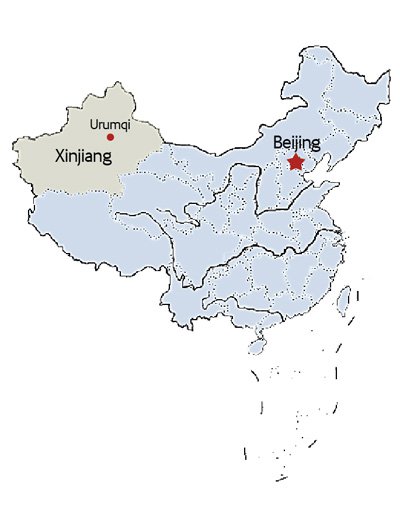|
Xinjiang has long been known for its abundant natural resources, such as oil, coal, and natural gas. However, exploitation of resources has enriched large enterprises and entrepreneurs rather than benefiting the local economy and people.
Experts say that Xi's remarks suggest that the central and local governments will focus more on developing labor-intensive industries, agriculture industrialization and other traditional local industries. They believe as long as locals have businesses and jobs, they can make a living and have a promising future, instead of turning to terrorism.
Not in our name
Following the Urumqi bombing on April 30, a letter signed by 11 young Uygur people condemning the deadly terror attack quickly attracted attention online.
In the letter, the youths, including five college graduates and six college students, spoke of their grief, their anger and their resolution to denounce terrorism.
"Silence is a kind of acquiescence to the terrorists," said Merdan Weli, a Xinjiang University postgraduate student who raised the idea of the letter among his Uygur friends.
Merdan was at a restaurant two blocks away from the train station when the explosion occurred. Merdan said terrorists were damaging the reputation of the Xinjiang people. "We had to do something," he said.
Merdan discussed contents of the letter with friends on WeChat, a popular mobile instant messaging service.
Kurbanjan Weli, a North China University of Water Resources and Electric Power graduate now teaching Chinese in Urumqi, was the chief writer of the letter.
In the letter, Kurbanjan wrote, "Murderers, what do you want? You said you want respect and rights, but can't you see the mosque beside the bombing site? It is a place for serenity and peace. Have you got the slightest faith in religion? You tried to kill innocent people, regardless male or female, young or old—why the hatred toward them?"
The letter continued, "What have you got? Ending others' lives and getting blood on your hands? It's a sin!"
The end of the letter said, "Our enemies want to break our unity and solidarity because they are afraid of our unity. No more silence, let's stand together and crush them."
Many Internet users, some of whom have been debating whether it is still safe to travel and do business in Xinjiang, changed their perceptions after reading the letter.
"The letter reflects the true voice of the Uygur people, most of whom are kind and generous like the rest of us. A small handful of evil doers do not represent the whole group," Beijing resident Dong Jianxun wrote on Weibo, China's Twitter-like microblogging service.
Another netizen using the name "Bailongma" said that terrorists have "hijacked the Uygur ethnic identity as well as bringing shame and humiliation to people of all ethnic groups living in Xinjiang."
Ma Dazheng, a researcher with the Research Center for Chinese Borderland History and Geography under the Chinese Academy of Social Sciences, said that it was rare for young people from Xinjiang to express what they felt about terrorism.
"They are realizing that a widening rift between people in Xinjiang and other regions needs to be contained, because a harmonious relationship between different ethnic groups is in the interests of the Uygur people," Ma said.
The researcher added that it was essential for China to draw on the strength of the people to win the fight against terrorism, especially with the support of the Uygur people.
Email us at: lili@bjreview.com

| 